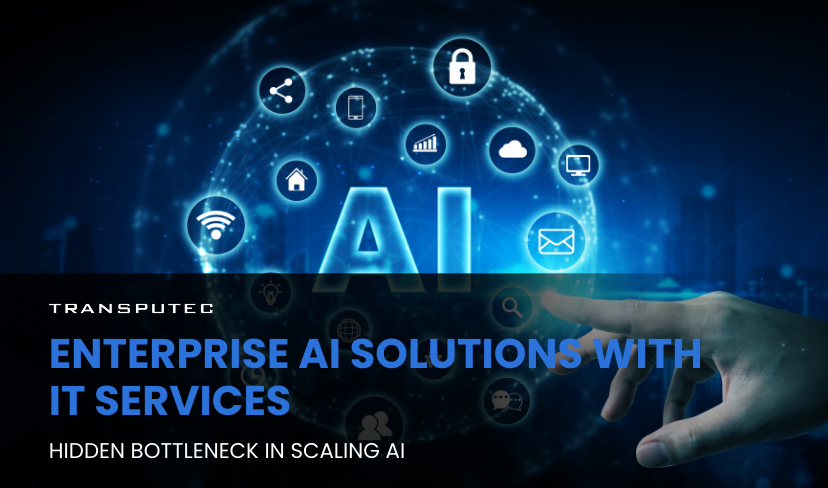Written by KRITIKA SINHA | MARKETING
Every ambitious CTO, IT director, or business leader has likely encountered the same dilemma: you’re sold on AI’s promise, but the actual implementation is a maze of infrastructure woes, data bottlenecks, skills shortages, and spiralling costs. You know the technology works—but getting it to work within your enterprise feels like pulling teeth.
And you’re not alone.
According to Gartner, 80% of AI projects never make it past the prototype stage due to issues unrelated to the AI model itself—think data governance, integration complexity, and scalability hurdles. Meanwhile, the pressure to deliver AI-led innovation is relentless, as competitors who crack the code early are already seeing up to 30% operational efficiency gains.
This blog uncovers how managed IT services—far from being just an outsourced helpdesk—are pivotal in accelerating and scaling Enterprise AI Solutions.
What Are Enterprise AI Solutions?
Enterprise AI Solutions refer to advanced artificial intelligence technologies strategically implemented to solve complex business problems at scale. Unlike isolated AI tools, these solutions integrate deeply with core business systems, automating workflows, enhancing decision-making, and delivering actionable insights across departments.
Key features include:
- Automation of repetitive and complex tasks
- Advanced data analytics for real-time insights
- Scalable architecture to handle high data volumes
- Seamless integration with existing enterprise systems
- Enhanced security and compliance
Transputec, with its AI division Kuhnic, helps businesses streamline AI adoption, optimise infrastructure, and drive real-world results.
What’s Holding Back Enterprise AI Solutions?
Before understanding how to accelerate, it’s important to know why many enterprises are stuck in neutral.
1. Inadequate Infrastructure for AI Workloads
AI and machine learning models demand high computational power, especially for training and real-time inference. Many enterprises are still reliant on legacy systems that weren’t built to support these compute-intensive tasks. Without scalable infrastructure, such as GPUs, distributed computing, and high-throughput data storage, AI models either run inefficiently or fail to deploy entirely.
Why it matters:
AI needs elasticity. If your infrastructure can’t dynamically scale based on workload demands, you’ll face delays, performance issues, or budget overruns.
2. Poor Data Quality and Integration Challenges
AI thrives on data, but only if the data is clean, structured, and accessible. In many organisations, data is scattered across silos—different departments, tools, and formats—making it hard to build unified datasets. Inconsistent, incomplete, or duplicate data leads to poor model accuracy and biased outcomes.
Why it matters:
Without high-quality, integrated data pipelines, even the most sophisticated AI models will generate unreliable insights, undermining decision-making.
3. Lack of Skilled Talent and Cross-Functional Teams
AI implementation requires more than data scientists—it involves data engineers, DevOps, cybersecurity experts, and domain specialists working together. However, many enterprises struggle to assemble teams with the right mix of skills. The global AI talent shortage compounds the problem, making it difficult to retain expertise internally.
Why it matters:
AI projects often fail not because of the model but because of organisational silos and a lack of collaboration between departments.
4. Insufficient AI Governance and Compliance Readiness
As AI systems increasingly influence decisions, enterprises must ensure ethical usage, transparency, and compliance with data privacy laws like GDPR, HIPAA, or CCPA. Without strong AI governance frameworks, companies risk regulatory penalties, reputational damage, and biased model outcomes.
Why it matters:
Regulatory compliance is non-negotiable, especially when AI touches sensitive or personal data. Failing to embed governance from the start can stall or derail projects entirely.
5. Failure to Move from Pilot to Production (The “AI Chasm”)
Many organisations succeed in building AI prototypes but never scale them into production environments. Reasons include lack of deployment tools (e.g., MLOps), unclear ROI, technical complexity, or change management issues. This gap between experimentation and operationalisation is known as the “AI chasm.”
Why it matters:
Staying in pilot mode means no business value is realised. Enterprises must have deployment-ready infrastructure and processes to translate AI innovation into scalable results.
Ready to Explore AI for Your Business?
Connect with our new AI division, Kuhnic, today for the free consultation!
How Managed IT Services Unlock Enterprise AI Scalability
Managed IT services are no longer just about fixing broken laptops or resetting passwords. When chosen wisely, they become a strategic enabler for Enterprise AI Solutions.
Here’s how they help:
1. Scalable Cloud Infrastructure Built for AI
Managed IT providers set up and maintain cloud environments that support the high computational demands of AI—like training deep learning models or running real-time analytics. They ensure these environments are elastic, cost-optimised, and compliant.
Why it matters:
You avoid infrastructure bottlenecks and pay only for what you use, allowing AI workloads to scale on demand without costly over-provisioning.
2. End-to-End Data Management and Integration
AI requires access to large volumes of high-quality data from multiple sources. Managed IT services offer tools and expertise for building secure data pipelines, cleansing data, and integrating it across silos (CRM, ERP, IoT, etc.).
Why it matters:
Consistent, real-time access to unified data streams is critical for training accurate models and deploying them across departments.
3. AI-Optimised Security and Compliance Frameworks
Managed service providers implement enterprise-grade security protocols and ensure that AI systems comply with data privacy laws such as GDPR, HIPAA, or CCPA. This includes encryption, access controls, monitoring, and audit trails.
Why it matters:
Trust and regulatory compliance are essential for AI adoption, especially in industries like healthcare, finance, and legal services.
4. Always-On Monitoring and Support for AI Systems
AI solutions in production need real-time monitoring to detect model drift, performance issues, or data anomalies. Managed IT services provide 24/7 support, proactive alerts, and system maintenance to ensure continuous AI operation.
Why it matters:
AI models degrade over time if not monitored. Managed services ensure stability, accuracy, and resilience at scale.
5. MLOps and DevOps Integration for Seamless AI Deployment
Managed IT services offer MLOps (Machine Learning Operations) and DevOps practices that automate the process of developing, testing, and deploying AI models. This includes CI/CD pipelines, version control, and rollback mechanisms.
Why it matters:
You reduce time-to-market and maintain agility, deploying AI features continuously and reliably.
6. Cost Control and Predictable Budgeting
By leveraging subscription or pay-as-you-go models, managed services make IT costs predictable. They eliminate the need for heavy upfront capital expenditures in infrastructure, tools, and human resources.
Why it matters:
Scalability must be sustainable. Predictable costs help business leaders allocate AI budgets confidently and justify ROI.
7. Talent Augmentation Without Hiring Overhead
Managed IT services bring a pool of specialists—data engineers, cloud architects, and AI ops experts—so you don’t have to hire and manage large in-house teams. This is especially valuable given the current shortage of skilled AI professionals.
Why it matters:
You gain instant access to top-tier talent and scale faster without long hiring cycles or retention challenges.
8. Strategic IT Advisory for Long-Term AI Success
Beyond technical support, managed service providers act as strategic advisors. They help enterprises align their AI goals with business outcomes, roadmap infrastructure upgrades, and prepare for future innovations (e.g., generative AI, edge AI).
Why it matters:
Scaling AI isn’t just about tech—it’s about planning. Strategic guidance helps you avoid missteps and pivot as your needs evolve.
Key Benefits of Using Managed IT Services for AI at Scale
1. Faster Time to Market
Managed IT services accelerate the entire AI lifecycle—from infrastructure setup and data integration to model deployment and monitoring. With pre-configured environments, automation tools, and expert support, businesses can go from prototype to production significantly faster.
2. Cost Predictability and Efficiency
With managed services, costs are typically structured as monthly or usage-based fees, eliminating the need for upfront capital investment in servers, software, and specialised talent. You only pay for what you use, with clear visibility into your IT and AI-related expenses.
3. Enterprise-Grade Security and Compliance
Managed service providers implement and maintain strong security frameworks that include firewalls, endpoint protection, encryption, and regular audits. They also ensure compliance with industry regulations like GDPR, HIPAA, and ISO standards, which is crucial when dealing with sensitive data in AI systems.
4. End-to-End Support and Maintenance
Managed IT services offer 24/7 monitoring, troubleshooting, and proactive maintenance for both infrastructure and AI applications. This includes performance tuning, uptime guarantees, and updates to keep your systems optimised and secure.
How Transputec and Kuhnic Power Enterprise AI Solutions
1. Full-Stack AI Infrastructure Design and Management
Transputec provides the underlying infrastructure essential for scaling enterprise AI, from cloud-native environments to high-performance computing setups. Whether you’re operating in AWS, Azure, or a hybrid model, Transputec ensures that your infrastructure is built to support large-scale AI workloads efficiently.
How Kuhnic adds value:
Kuhnic customises AI-ready environments on top of this infrastructure, ensuring that your models run optimally with minimal latency and maximum compute efficiency. Together, they deliver a plug-and-play ecosystem for Enterprise AI Solutions.
2. Integrated ModelOps (MLOps) and Deployment Pipelines
Transputec helps enterprises operationalise AI by integrating DevOps best practices into the machine learning lifecycle (known as MLOps). This includes automated CI/CD pipelines, containerised environments (using Docker or Kubernetes), and version control for models.
How Kuhnic adds value:
Kuhnic manages the lifecycle of AI models—from training and testing to deployment and retraining—ensuring your models remain accurate, adaptive, and easy to update. This end-to-end deployment capability helps businesses bridge the gap between AI experimentation and production.
3. Secure and Compliant AI Ecosystems
Transputec brings decades of experience in cybersecurity, offering ISO 27001-certified practices, data encryption, role-based access controls, and real-time threat monitoring. This is essential for enterprises handling sensitive or regulated data within their AI systems.
How Kuhnic adds value:
Kuhnic embeds compliance-aware AI architectures into solutions, ensuring that every layer of the AI pipeline—data collection, training, and inference—is aligned with regulations like GDPR, HIPAA, and other industry-specific frameworks.
4. Custom-Built AI Applications Tailored to Business Needs
While many providers offer generic AI tools, Kuhnic builds bespoke AI applications tailored to each client’s industry, workflows, and KPIs. These include predictive analytics tools, customer segmentation engines, NLP-based document processing, and more.
How Transputec supports this:
By managing the IT infrastructure, APIs, and integration layers, Transputec ensures that these custom AI applications are embedded seamlessly into your enterprise systems—whether ERP, CRM, or proprietary platforms.
5. Strategic AI Consulting and Innovation Roadmapping
Transputec works closely with clients to assess AI readiness, identify high-value use cases, and develop long-term digital transformation strategies. They don’t just implement technology—they help businesses evolve around it.
How Kuhnic adds value:
With a team of AI researchers and data scientists, Kuhnic supports feasibility studies, pilot development, and algorithm selection. They help refine your AI vision and align it with measurable business goals, ensuring you’re investing in the right solutions, not just the latest trends.
Conclusion
Successfully scaling Enterprise AI Solutions isn’t just about hiring data scientists or building models—it’s about integrating AI into your core operations with speed, security, and sustainability.
In this blog, we explored how managed IT services solve key problems in AI scalability, how Transputec and Kuhnic offer a full-stack solution, and how real businesses are accelerating their AI maturity with the right partnership. From data integration to deployment, a strong, managed IT foundation enables you to focus on what really matters: turning AI into measurable business value. Contact us today to connect with a Transputec expert and get started with a tailored roadmap for your enterprise AI journey.

Ready to Unlock the Full Potential of Artificial Intelligence!
Connect with an expert and get started on the next generation of IT support.
FAQs
1. What makes Transputec different from other managed IT providers?
Transputec combines 35+ years of enterprise IT experience with a deep focus on innovation through its AI division, Kuhnic. This means you get traditional infrastructure support and advanced AI deployment under one roof—streamlining your path to enterprise AI adoption.
2. Can Transputec help with AI compliance and data privacy?
Yes. Transputec’s services are fully aligned with GDPR, ISO 27001, and other global standards. They offer encryption, audit trails, and policy automation to ensure your Enterprise AI Solutions remain compliant and secure.
3. How does Kuhnic assist with AI model deployment?
Kuhnic provides ModelOps services—automating version control, monitoring model drift, and ensuring seamless integration into your existing systems. This ensures your AI models are always production-ready and optimised.
4. What industries benefit most from Enterprise AI Solutions via Transputec?
While all sectors can benefit, Transputec has deep expertise in finance, healthcare, logistics, and manufacturing, helping clients with use cases like fraud detection, predictive maintenance, and customer sentiment analysis.
5. What is the first step to getting started with Transputec and Kuhnic?
Reach out via their contact form or schedule a consultation. The team will assess your AI readiness and propose a tailored strategy covering infrastructure, integration, and model deployment, all fully managed by experts.




